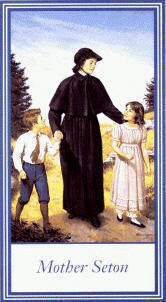May 14
Of
this apostle nothing certain is known beyond what is contained in the
epistle. In the Introit of the Mass the Church sings: “To me Thy
friends, O God, are made exceedingly honorable; their principality is
exceedingly strengthened. Lord, Thou hast proved me and known me;
Thou hast known my sitting down and my rising up. Glory be to the
Father, and to the Son, and to the Holy Spirit. As it was in the
beginning, is now, and ever shall be, world without end. Amen.”
Prayer
O
God, Who didst associate blessed Matthias to the company of the
apostles, grant, we beseech Thee, that, by his intercession, we may
ever experience Thy tender mercy towards us. Through Jesus Christ our
Lord, etc. Amen.
Epistle: Acts 1:15-26
In
those days Peter rising up in the midst of the brethren said (now the
number of persons together was about an hundred and twenty): Men,
brethren, the Scripture must needs be fulfilled which the Holy Ghost
spoke before by the mouth of David concerning Judas, who was the
leader of them that apprehended Jesus: who was numbered with us, and
had obtained part of this ministry. And he indeed hath possessed a
field of the reward of iniquity, and being hanged burst asunder in
the midst, and all his bowels gushed out. And it became known to all
the inhabitants of Jerusalem: so that the same field was called in
their tongue, Haceldama, that is to say, The field of blood. For it
is written in the book of Psalms: Let their habitation become
desolate, and let there be none to dwell therein. And his bishopric
let another take. Wherefore of these men who have companied with us,
all the time that the Lord Jesus came in and went out among us,
beginning from the baptism of John until the day wherein He was taken
up from us, one of these must be made a witness with us of His
resurrection. And they appointed two, Joseph, called Barsabas, who
was surnamed Justus, and Matthias. And praying, they said: Thou,
Lord, Who knowest the hearts of all men, show whether of these two
Thou hast chosen to take the place of this ministry and apostleship,
from which Judas hath by transgression fallen, that he might go to
his own place. And they gave them lots, and the lot fell upon
Matthias, and he was numbered with the eleven apostles.
Gospel: Matthew 11:25-30
At
that time Jesus answered and said: I confess to Thee, O Father, Lord
of heaven and earth, because Thou hast hid these things from the wise
and prudent, and hast revealed them to little ones. Yea, Father: for
so hath it seemed good in Thy sight. All things are delivered to Me
by My Father. And no one knoweth the Son, but the Father, neither
doth anyone know the Father, but the Son, and he to whom it shall
please the Son to reveal Him. Come to Me, all you that labor and are
burdened, and I will refresh you. Take up My yoke upon you, and learn
of Me, because I am meek, and humble of heart, and you shall find
rest to your souls. For My yoke is sweet and My burden light.
The
wise and prudent referred to in this gospel are the proud scribes and
Pharisees, who, in their imaginary wisdom, would not receive the
incarnate and suffering Son of God, but despised and rejected Him; in
general, they represent also all who in their pride would measure
everything by their own understanding, and to whom, consequently, the
mysteries of faith seem foolishness. The little ones are the
apostles, who, although taken from a low condition of life, without a
learned education, but rather ignorant, were enlightened by God to
know the deepest mysteries, because they had docile and humble
hearts, desirous of salvation. Thus God gives grace to the humble,
while the proud go away empty.
To
those who bear His yoke, and follow Him, Christ promises peace of
mind, temporal and eternal happiness; and, indeed, we must confess
that as often as we are disquieted and discontented the cause of it
is our selfishness and want of submission to the will of God, our
pride and vanity. Learn, then, to love to be meek and humble, if you
would enjoy peace, here or hereafter.
Prayer to Saint Matthias
O
Saint Matthias, glorious apostle and martyr of Jesus Christ, who, by
the special providence of God, wast added to the eleven apostles in
the room of the traitor, I humbly beseech thee to obtain for us the
grace of Him Who chose thee from all eternity, that, assisted
thereby, we may, after thy example, keep the commandments of God,
practice good works, and thus merit to be numbered with the elect.
Through Jesus Christ our Lord, etc. Amen.
– Goffine's
Devout Instructions


